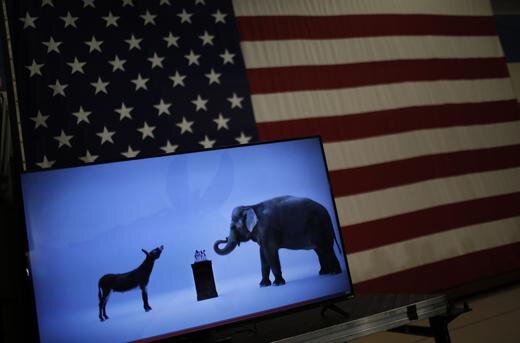The Democratic Delegate System: A Simple Guide to a Complex Process
By: Eric Spencer
Image: Carlos Barria/Reuters
For a Democratic candidate to receive the presidential nomination- On the first ballot at the Democratic National Convention they must garner 1,991 of a possible 3,979 pledged delegates. If no candidate wins an outright majority, even if they win a plurality, the convention will be contested and voting will go to a second ballot. At that point an extra 771 delegates, known as superdelegates will come into play. On the second ballot, a candidate must win a majority of the new 4,750 possible delegates.
Pledged Delegates– The state-pledged delegates consist of state and local elected leaders within the Democratic Party: mayors, state representatives, etc. Each state has a certain number of pledged delegates to award to a candidate and are expected to pledge their votes based on the outcome of the primary election results of their state. However, they are not obligated to do this, and barring any conflicting individual state rules, can effectively cast their vote to any candidate of their choice at the Democratic National Convention.
Superdelegates– These are made up of congresspeople, governors, senators and former presidents; but the vast majority of superdelegates are made up of the Democratic National Committee elites. These delegates can freely vote for any candidate they choose.
If a candidate drops out, what happens to their pledged delegates?– If a candidate that has pledged delegates drops out of the race, the Democratic National Committee has said these delegates should “vote their conscience” even though the candidate that dropped out may have endorsed one of the remaining candidates. This means that, again barring any conflicting individual state rules, these delegates are free to vote for any candidate they choose at the convention.
Changes to the superdelegate system– Prior to the 2020 presidential election, superdelegates were guaranteed a vote on the first ballot. In 2020, superdelegates will only come into play if the convention is contested and the nomination goes to a second ballot, meaning if no candidate wins an outright majority of the pledged delegates, then superdelegates will be allowed to cast their votes.
There were only two candidates in 2016 that won pledged delegates so it was inevitable that one of the candidates would win a majority of pledged delegates going into the convention. Although Bernie Sanders and Joe Biden are the only two viable candidates left in the 2020 race, Warren, Bloomberg, Buttigieg, Klobuchar and Gabbard still hold 159 pledged delegates following Super Tuesday. This means that the chances of Sanders or Biden obtaining an outright majority has been greatly diminished, and the chances of a contested convention is now very high.
The New York Times recently spoke to 93 superdelegates, of those, 84 said they would risk intra-party damage to oppose Sanders if he enters the convention with just a plurality.
If this is still confusing, Democratic Party operative and former State Representative from South Carolina, Anton Gunn summed up the process in his statements on MSNBC recently when he said,
“The party decides the nominee. The public doesn’t really decide the nominee.”

